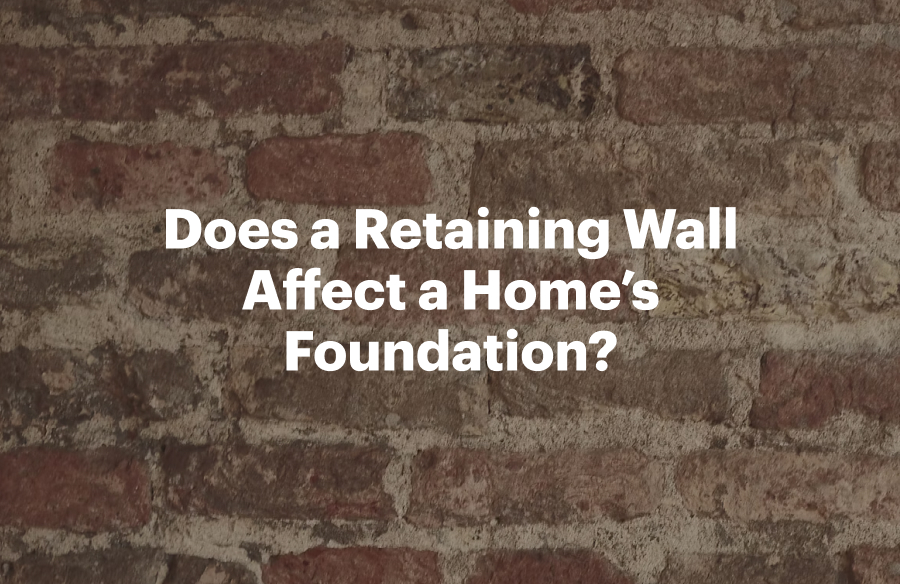Retaining walls are a critical piece of infrastructure in many homes. They help to control soil erosion, create a path for running water, and level areas on once sloped land. However, many homeowners in Fort Worth and Dallas, Texas wonder if these walls can impact the stability of their home’s foundation. Retaining walls are designed to support the landscape from shifting. In this blog, we hope to help you understand the dynamic between retaining walls and home foundations. With this information you’ll have the knowledge of making informed decisions about a retaining wall and your home’s foundation.
How Retaining Walls Work
A retaining wall is a manmade structure built to hold back dirt and prevent erosion in areas with uneven land. These walls are constructed using concrete, stone, brick, or other sturdy building material. Then it is reinforced to help deal with the lateral pressure from the soil. The main purpose of retaining walls is to help stabilize sloped land, redirect water away from a home’s foundation, and create usable space in yards with sloped land. If done correctly, a properly designed and constructed retaining wall should function without affecting the foundation, but if they are not built correctly, they can cause problems.
Can a Retaining Wall Damage a Home’s Foundation?
A retaining wall can affect a home’s foundation if certain conditions are met. For example, if the wall is near the foundation, not constructed properly, or fails from the lateral forces, it can cause a foundation’s home to shift. The most common ways a retaining wall can cause the need for foundation repair include:
When a retaining wall is placed too close to a home, it can affect the movement of soil, leading to uneven pressure holding down the piers of the foundation. Over time, this shifting soil can cause the foundation to settle or move. Additionally, if the retaining wall is not built to withstand the weight of the soil surrounding a foundational pier, it may displace the soil near the home that was helping keep the pier wedged into the ground.
Another factor people consider is poor drainage. Retaining walls should include some channels for drainage, such as weep holes, gravel backfill, and drainage pipes, to prevent water from building up or pooling. If water is not properly directed away from the home, it can lead to flooding.
Signs That a Retaining Wall May Be Impacting Your Foundation
Homeowners should inspect their property for signs that a retaining wall is impacting their home’s foundation. Check for cracks in your home’s foundation, hard to open doors, or hairline cracks on exterior walls on the side where the retaining wall is. This may indicate shifting soil or a failing retaining wall. Uneven floors inside the home could be another sign of foundation movement. If you notice becoming difficult to open or close, this may be due to the foundation shifting. Additionally, you can visibly spot any signals that the retaining wall is under too much stress, which could eventually lead to failure and potential foundation damage.
How to Prevent Retaining Wall Issues That Affect the Foundation
When you are thinking about installing a retaining wall make sure you hire a structural engineer to ensure proper design and construction. From there a professional crew, like Maestro’s Foundation Repair, can knock out this job and prevent a retaining wall from causing foundation issues. A constructed and engineered retaining wall should be built with quality materials, reinforcement, and drainage to ensure it can handle the weight of the soil. Always speak with a professional foundation expert or structural engineer before building a retaining wall to ensure that a retaining wall is a good idea on your property.
What to Do If a Retaining Wall Is Affecting Your Foundation
If you think that a retaining wall is impacting your home’s foundation, it is important to take action as soon as possible. A foundation repair specialist can make the situation better by determining whether the wall is contributing to foundation damage. If something is detected they could try a variety of methods like reinforcing the retaining wall, improving drainage, or making foundation repairs to restore stability. In severe cases, it may be necessary to rebuild the retaining wall with stronger materials and better support.
A properly constructed retaining wall should not negatively impact a home’s foundation, but poor design, improper placement, and drainage issues can lead to serious structural problems. Homeowners should ensure that retaining walls are built correctly, regularly maintained, and repaired when necessary to prevent foundation issues. If signs of foundation damage appear, schedule a free evaluation with Maestro’s Foundation Repair. We are experts that can help protect the home’s structural integrity and prevent costly home foundation repairs in the future.
